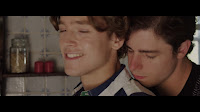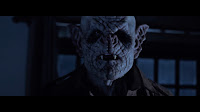Director: William Stead
Release date: 2023
Contains spoilers
Children of the Night is a feature directorial debut for William Stead and, whilst it does do things wrong, it is an impressively shot budget film. Set in the Second World War it absolutely strives to overcome its budget and creates quite an interesting story with a wonderfully queer aspect.
It starts in a trench and at first we just hear the sound of battle and then we see, staring forward, Jim (Harry Giubileo) and the first thing I thought was shell shock – the film brilliantly realising, in a shot and actor’s expression, the horror of war. The trench is under attack, the order for retreat has been sounded but… As we see the attack the opting to show part of the battle (rather than mimic it with visual and sound effects within the trench only) was a bad choice. The cgi planes and armoured vehicles were poor. To be fair, it wasn't a repeated mistake.
 |
| cloaked figure |
Jim fights against his own fear as he moves, he is thrown in a blast and comes round to see a figure in the trench, back to him in a red velvet cloak… the figure starts to turn and then things turn to black for Jim. When he comes round, the men around him are dead until he realises that Bob (Jay O'Connell, Vampire Virus) is alive with an injured leg. Getting closer he realises his comrade has a gash to the neck also. The radio is broken and so he patches Bob up and they make their way through the countryside trying to find their troops.
 |
| Harry Giubileo as Jim |
Their journey takes them to a church at night, Jim stepping on an unearthed corpse as they approach. In the church the religious Jim, in desperation, fills his canteen from a holy water font (of course that will come in handy later). They detect movement outside and hide when German troops come in with an injured man. Jim speaks various languages and so picks up that he was attacked by something with yellow eyes. He doesn’t pick up on the word Nosferatu. The soldier dies and the Germans leave taking him to be buried.
 |
| monstrous hand |
They continue their journey but Bob is suffering and Jim goes to soak bandages in a river. We see a monstrous hand reaching to his shoulder (he thinks it’s Jim) and then he realises there is a stranger there, Louis (Ivan du Pontavice). Louis is a French civilian from close by but the distrustful Bob has Jim tie him up. Jim shows kindness but, in the morning, Louis bonds are gone and Jim is injured at the neck again and unconscious. Jim, thinking his friend has just collapsed, takes Louis up on bringing Jim to the farm his father, Francois (Johnny Vivash), owns. Of course Louis and Francois are vampires (feeding off soldiers) – Francois has become distrustful of the British as well as the Germans as a British barrage killed his wife. Louis and Jim are attracted to each other and I’ll cover that off before touching on the vampires.
 |
| Jim and Louis |
There is a love story at the heart of this and it is generally really well done. There is a palpable chemistry between Louis and Jim but this sometimes goes astray as that chemistry may not have been as apparent in some of the situations, as danger made them concentrate at the tasks at hand, whilst the actors keep that feel going despite being shot at, for instance, when Germans hunt the vampires down. Nevertheless, generally it works brilliantly. That brings me to homosexuality and the British military.
 |
| love story |
Jim talks about being kicked out of home at fifteen due to his sexuality and turning towards becoming clergy until war broke out and he was drafted. He says that some of his unit knew and gave him some level of stick for it (there is a homophobic jibe by Bob in dialogue). It is true that gay and bisexual men were called up for service in WW2 and no issue was made of their sexuality by the powers that be, as they needed warm bodies to throw into battle. Afterwards, however, they were treated shockingly and until 2000 a man found to be gay or bisexual in the British forces was arrested, imprisoned and then dishonourably discharged. The UK military did not change because they wanted to but because the (European) courts forced them to and I believe it remains one of the great shames of the UK forces.
 |
| burnt by the cross |
The vampires in this can walk in daylight but can’t change form into their bat-like monstrous guise until night falls. A bite that kills seems to turn a victim (there is a vampire returned from death but also several German ones who have changed into monstrous form but appear dead – what was going on there wasn’t clear). They can be burned by crosses and holy water (and yet we see crosses in the farmhouse and worn by a vampire) and can bless a room that causes the vampire to need to be invited back in. That was interesting, though the invitation would seem to be non-verbal – leaving the door open for them was enough. Louis is 800-years old.
 |
| vampire |
The effects could miss. In shadow/darkness the monstrous form of the vampire was good. In decent light they seemed overly rubbery (a set of talon festooned fingers wobbled like the rubber they were). We get a burial that wasn’t even a shallow grave more the actor led on the ground and dirt shuffled onto him – I assume they couldn’t get permission to dig a hole at the location. The war aspect feels small, because of the small cast and limited budget, but better that than to rely on CGI that would have ruined the film. However, the photography is crisp and there is a real sense of trying to pull a quality production together. It is the chemistry between du Pontavice and Giubileo that is the beating heart of the film though. I was pleasantly surprised at the quality of the production, 6 out of 10.
The imdb page is here.
















No comments:
Post a Comment